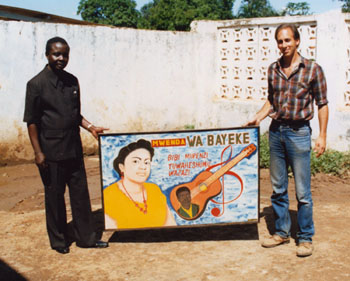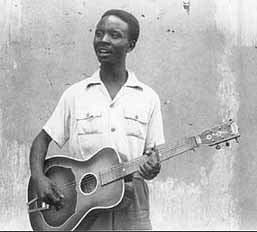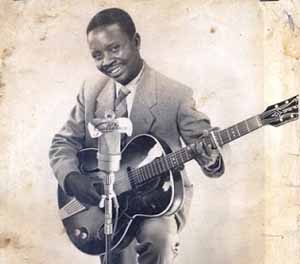Elijah Wald – Jean-Bosco Mwenda interview
 Interview conducted at Jean-Bosco Mwenda's home in Lubumbashi,
Zaire, in February, 1990, during the period I was taking guitar lessons from him. (To hear the original recording, in French, click this link.)
Interview conducted at Jean-Bosco Mwenda's home in Lubumbashi,
Zaire, in February, 1990, during the period I was taking guitar lessons from him. (To hear the original recording, in French, click this link.)
To begin, where were you born?
I was born here, in Lubumbashi. That is, it used to be Elizabethville,
before independence. My parents lived here in Lubumbashi. My father, he
studied with the Catholic missionaries of the mission Don Bosco, which still exists; that
is why I am named Jean-Bosco. And my father he played piano, as a musician.
Me, I do not play the piano; me, I play guitar -- that's how it turned out for me.
And you went to school here?
Afterwards, at the age of six, my father they asked him to go work in Likasi, Jadotville.
So we went to Jadotville. That is where I began to play the guitar.
What age were you when you began?
Oh, the guitar I began to play at the age of 20, more or less. I was still
small, still young.
Were there other guitarists there?
There were other guitarists, who played in the cafes. The cafe, that was
not the European cafe; the drinks were made in the authentic way, the
village way.
 How did they play?
How did they play?
Almost the same style that I play, but this was not exactly the same thing.
Me, I changed the style.
How did you change it?
It came to me like that. I also, I don't know.
They played this style, with the bass and the melody?
Yes, the same melody. There were three or four guitarists who I knew. They are already
dead. They were older than me at that time.
You also listed to foreign music, at that time?
Yes, I listened. There was the phonograph [he mimes turning the handle
of a wind-up phonograph.] There was Spanish music,* records like that, European
records, on the phonograph.
Did you play that music as well?
No, it was a bit too difficult to play.
Did that influence the music here?
It was their style, the Spaniards played differently. It is not the same
thing as here.
In the cafes, was it just guitarists, or were there other instruments?
For the moment, there are just orchestras [bands]. To find people who play like me, it's not good.
But were there also orchestras in those days?
At that time, no. The orchestras here began around, what would it be... something like 1958-60, 1960 to 1965.
So pretty much all the music in town was guitarists?
It was the guitarist who played like that.
Did you also hear people in town who played African instruments?
Yes, there were singers who sang for the [chefs ??], with village
instruments. They played very well. Indeed, they had some pieces which I
tried to play as well.
Did you originally speak Swahili, or a village language?
No, I grew up here in town, not in the village; I always spoke Swahili.
But you sang in both?
Yes.
What is your village language?
It was Kiyeke and Lisanga, the two languages.
Before making records, did you also play in the cafes?
I started in the cafes. When I started the records, I was truly a good
guitarist.
The first record was in which year?
In 1951, and the company was Gallotone.
When you and the others played in the cafes, were you paid by the cafe, or by the customers?
No, back then it was not for money. Before, it was to play like that, to please the
people. If there was someone who wanted to give you something, he gave it, but
it was not obligatory.
You did not earn your living like that?
No. I began to earn a little when I began to make records.
So what did you do for a living, before that?
No, [laughing], I got by.
You began in Jadotville?
I studied in Jadotville. When I left Jadotville, I came here to Elizabethville,
now Lubumbashi. I began to work in the bank. I worked at the bank, and also
I played guitar.
 When you started making records, did you stay here?
When you started making records, did you stay here?
I stayed here, in Lubumbashi,
after the records. Because they bought the records everywhere. By invitation, I was
invited in '59 to Nairobi, Kenya, to make commercials for the medicament
Aspro, "Aspro dawa ya kweli" in Swahili, a medication for the head. I did those commercials for six months;
then I came back here. In '69 I was invited to the United States, to Newport.
From Newport, I traveled by road to Washington. In Washington, I visited
the White House, it was the time of President Nixon. Miss Nixon had us come
into the house. And then, after that, I went to the tomb of Kennedy, to see the president's tomb, and afterwards
I visited the airplane which had crossed the Atlantic Ocean, the DC3, it was in the museum.
At that time, did you continue to work at the bank?
I worked at the bank, and played music as well.
So you never just did music?
Yes, I make music and I
work. But when I left the United States, I began to have my businesses as
well. I became a merchant, working for myself. I tried to open a cafe-bar, things like that. In '82 I was invited to Germany, the Federal Republic of Germany. I was in Frankfurt, I was in
Berlin, I was in Munich, a musical tour. When I left Germany, I was invited
to Austria. I spent two weeks in Vienna. And then I went back to Brussels
and played at the University. Then I came back here. At that time, I
worked at the Giacomine [mining company], as an entrepreneur.
Are all the songs you sing your own, or have you also sung other people's songs?
Me, I have never sung other people's songs. I make the compositions, I sing them myself. There are many musicians who
play my songs, and me, I play my own songs.
When you began, the players in the cafes, they played
their own songs or folklore?
There was a lot of folklore, which the musicians of the time played. But
me, my own songs, I made them myself.
How did you begin to write songs?
For me, this was not from the school. It came to me like that. I compose
the music first, then I begin to think about the words. And I write -- if
I sing one time, two times, it sticks in my head.
You continue to write new songs?
Yes, yes. But I do not want to make recordings. I recorded something in
South Africa, at Capetown. I recorded some songs, ten songs. I am waiting, if it somes out we'll see what happens.
About how many records have you made?
Oh... With Gallotone, I made a hundred songs -- a hundred records, so that would make two hundred songs.
Those were 78s?
The 78
rpm records, at that time.
That was in what period?
Ah... from '51 to '57, '58. Even in the '60s, they
still sold those kind of records.
* Presumably meaning Cuban; the Trio Matamoros in particular was hugely influential in the Congo.